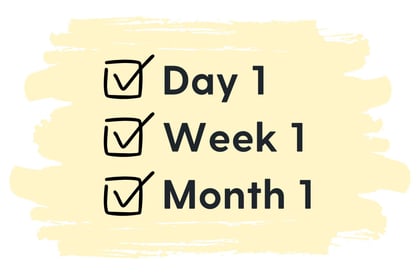So you’ve got a new job? Congratulations!
Whether you were in your last role for two decades or you prefer to move around every couple of years, it’s always slightly nerve wracking being the new person. You might be working your notice period, enjoying a few weeks of gardening leave or returning to work after a career break – whichever it is, you’ll be mentally preparing to learn a lot of new things, meet a lot of new people and start delivering value.
If you’re starting a new job at a small business, it’s natural to want to impress your new CEO straight off the bat. Often, the CEO will have delegated hiring responsibilities to someone else on the team, so your onboarding period may be the first time you interact with them.
So how do you make a stellar first impression? 5app’s very own CEO, Philip Huthwaite, revealed exactly what impresses him when someone joins a business.
Communication, communication, communication
“For me, it’s all about communication and confirmation. Communicate frequently with your team and with your boss, and make sure you’re always confirming what you understand about what you’ve been asked to do.”
It should be obvious, but a surprising number of new employees don’t want to be a bother or worry that asking too many questions will make them look incompetent, so they silently plough through their onboarding materials and try to fly under the radar.
Philip recommends doing the opposite – after all, you don’t want your new team to forget you exist! Asking questions to confirm your understanding is a good thing – in fact, the new employees who don’t ask questions are a bigger concern.
“If a new starter is asking good questions from day one, it sets them up for success when they get further into the role. Once they’ve completed their onboarding and are ready to start tackling other tasks, they will likely keep the good habit of communicating. I’d much rather someone asks for clarification than wasting time barking up the wrong tree!”
Provide short summaries of your progress
If you’re really looking to impress your CEO when starting a new job, proactively providing summaries of your progress and achievements will ensure everyone knows what you’ve been working on and how your onboarding period is going.
Of course, you don’t need to send these directly to the CEO, but sharing updates with your boss will help them report back to the CEO about how you’re getting on.

Philip recommends starting with day 1, week 1 and month 1 summaries. These don’t need to be lengthy – a few bullet points covering what you’ve been working on, what you’ve learned and what you’ve achieved should be enough. The idea here is to share this information before you’re asked – after all, when your new boss asks what you’ve been doing for the last week, it’s easy to feel defensive or like you’re not doing enough.
Looking for a quick, easy way to summarise your week? Check out our ultimate list of generative AI tools for inspo!
When you encounter problems, suggest solutions

It often takes a fresh pair of eyes to spot long-running problems in a business, and the unique perspectives of a new employee can help reveal ingrained issues that existing employees have been overlooking for a long time.
Absolutely everyone in a business should feel empowered to raise issues they see, whether they’ve been there for 20 years or 3 days. Making people feel comfortable to flag concerns or problems is closely linked to your company culture (or learning culture), and a new employee’s manager should clarify on day one that all input and feedback is welcome.
“When an employee flags an issue, I’m always happy to hear their ideas for solutions. It doesn’t matter if it’s their first few days in a new role – if someone with a new perspective can bring me a way to solve a business problem, that’s a good way to impress me in the early days!”
Of course, that doesn’t mean running to your new manager every five minutes with criticisms and complaints, but if you see a way something could be done better, or you solved a similar problem in a previous role, it’s worth raising your ideas. In fact, sometimes the best ideas come from newer employees, who won’t yet be biased by ‘the way the company does things’, so don’t be afraid to speak up when you’re starting a new job!
